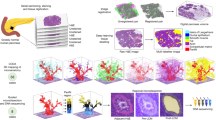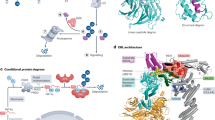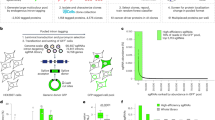Abstract
THE enzyme, aminopeptidase, was included in an investigation on histochemically demonstrable enzyme activities in human pathological lesions. This enzyme was demonstrated by Burstone's method1 except that cryostat sections were used which were fixed for 5 min. in acetone.
This is a preview of subscription content, access via your institution
Access options
Subscribe to this journal
Receive 51 print issues and online access
$199.00 per year
only $3.90 per issue
Buy this article
- Purchase on Springer Link
- Instant access to full article PDF
Prices may be subject to local taxes which are calculated during checkout
Similar content being viewed by others
References
Burstone, M. S., and Folk, J. E., J. Histochem. and Cytochem., 4, 217 (1956).
Burstone, M. S., J. Nat. Cancer Inst., 16, 1149 (1956).
Braun-Falco, O., Klin. Wochensch., 35, 50 (1957).
Author information
Authors and Affiliations
Rights and permissions
About this article
Cite this article
WILLIGHAGEN, R., PLANTEYDT, H. Aminopeptidase Activity in Cancer Cells. Nature 183, 263–264 (1959). https://doi.org/10.1038/183263a0
Issue Date:
DOI: https://doi.org/10.1038/183263a0
This article is cited by
-
Positioning of aminopeptidase inhibitors in next generation cancer therapy
Amino Acids (2014)
-
Verhalten von Enzymen in Sehnenzellen von Ratten nach einem Lauftraining unterschiedlicher Dauer und Intensit�t
Archiv f�r Orthop�dische und Unfall-Chirurgie (1973)
-
Nachweis und diagnostische Bedeutung der Leucinaminopeptidaseaktivit�t in menschlichen Blut-und Knochenmarkausstrichen
Klinische Wochenschrift (1971)
-
Die Bedeutung der Enzymhistochemie in der Diagnostik sekund�rer Hautcarcinome
Archiv f�r Klinische und Experimentelle Dermatologie (1970)
-
Spaltung vonl-Leucyl-�-Naphthylamid-HCl durch Leukocyten
Klinische Wochenschrift (1964)
Comments
By submitting a comment you agree to abide by our Terms and Community Guidelines. If you find something abusive or that does not comply with our terms or guidelines please flag it as inappropriate.



